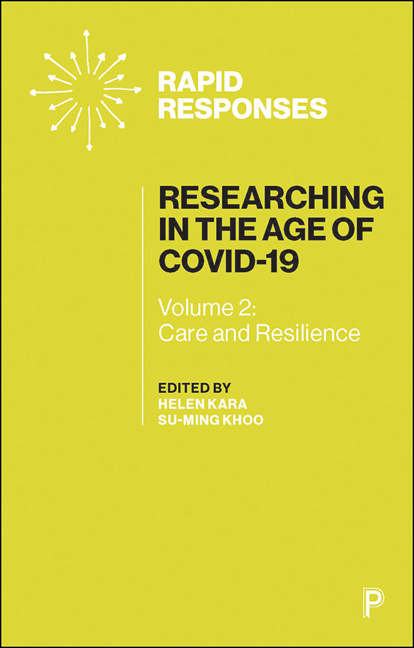1 - Do the Best you can: Researcher Safety in a Pandemic
Published online by Cambridge University Press: 23 March 2021
Summary
This chapter addresses researcher safety, wellbeing, training and assistance needs within the context of COVID-19. It covers sensitive topics so proceed at a pace that suits you, using additional sources of help as required and noting it is not a replacement for supervision, medical or therapeutic care, or legal advice.
Your wellbeing
Before you read further note what you have managed so far – even if it hasn't felt like you are coping. Being gentle and loving towards yourself is important. These are not ordinary times and that means prioritizing your needs, comfort and care. A repository of free, multi-age, multi-language mental health resources for your use can be found here and alongside this chapter I have written Being Well in Academia: Ways to Feel Stronger, Safer and More Connected (Boynton, 2020a) and Wellbeing in the Pandemic: Building a Recovery Syllabus for Staff and Students (Boynton, 2020b). Both provide selfdirected learning on mental health, assisting other people, crisis support and tips for self-care.
BC (Before COVID-19)
Researcher safety priorities prior to the pandemic included a growing understanding of the need to provide health and safety training to researchers (Boynton, 2016; Tolich et al., 2020); with a particular focus on lone working (Health and Safety Executive, 2020), buildings and materials (Kuespert, 2016; Stoaks, 2019), travel and fieldwork (Williams et al., 1992), researching ‘sensitive issues’ (Cornejo et al., 2019; Fenge et al., 2019) and studies during humanitarian disasters or conflict (Sluka, 2020), possibly with participants or communities stereotypically deemed ‘dangerous’ (Kendra and George, 2001; Parker and O’Reilly, 2013). All of these are important, but risk stigmatizing particular communities including ethnic minorities, poor, mentally unwell, substance users or other marginalized groups (Boynton, 2016) while suggesting other people, places (including online spaces) or topics are ‘safe’ (Boynton, 2016; Chiswell and Wheeler, 2016; Morgan and Pink, 2017; Pritchard, 2019; DeGroot and Carmack, 2020). When danger is located ‘out there’ (Wood, 1999) the everyday toxicity and threats from academia of racism (Ahmed, 2012; Bhopal, 2019; Sian, 2019), colonialism (Kuokkanen, 2008), sexism (Savigny, 2014), lesbian, gay, bisexual, transgender and queer or questioning plus (LGBTQ+) phobia (Kneale and Becares, 2020), classism (Atherton and Mazhari, 2019), ableism (D’Evelyn et al., 2018) and these intersections can render methodologies risky or unfit for purpose and pose significant risks to students, researchers, participants and other academic staff.
- Type
- Chapter
- Information
- Researching in the Age of COVID-19Volume II: Care and Resilience, pp. 9 - 24Publisher: Bristol University PressPrint publication year: 2020



